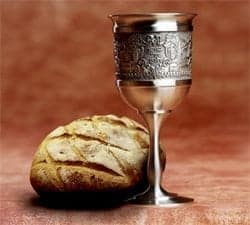When the Lord Jesus first instituted this meal, at the first occasion of it, He was greatly troubled in His spirit. The reason for the trouble is that there was treachery at the Table: “When Jesus had thus said, he was troubled in spirit, and testified, and said, Verily, verily, I say unto you, that one of you shall betray me” (John 13:21).
The Lord was asked by Peter through John who the traitor would be. The Lord responded by saying that the disciple He would give the morsel of bread to, that was the one who would betray Him (John 13:25). Upon Judas taking the morsel, Satan entered into him, and Jesus told him that whatever it was he was going to do, he should do it immediately. And so it was that Judas went out into the night, and by so doing went out into everlasting night.
So we should note that Satan was present at the institution of this meal. No doubt in some way, shape or form, he is present now. And we should also note that Judas went out into the night with that morsel, from the hand of Jesus Himself, in his hand, or in his mouth, or in his stomach. And as the everlasting bread entered him . . . Satan entered him.
This is disconcerting to us. Why did Jesus let Judas participate? Especially since Satan himself was right there at his elbow? Once again we start wondering about Jesus and His tendency to tolerate low standards.
Some Christians want to insist that their observance of the Supper be kept more pure than Jesus managed to keep His observance of it. So they set up guards, and hurdles, and interviews, and clearances—as though that by itself could ever be successful.
But other Christians just take the presence of treachery in stride. They serenely go on administering communion to apostates and libertines, hypocrites and scoundrels because, they say, they are a church and not a sect. Jesus gave the bread to Judas, they say. Yes, but Jesus was greatly troubled by the treachery, and they are not troubled by it at all. Indeed, they want actively to encourage it.
So as we gather, the question should never far away from us—“Lord, is it I?” And at the same time, in a church that is cultivating warm affection for the Lord Jesus, the answer comes back overwhelmingly—“No, it is not.”
So come, and welcome, to Jesus Christ.


How wonderful! That was the most comforting post I’ve ever read here.
I forget the details, but I recall a pretty good case can be made that Judas left before communion, depending, I suppose, on how you fit the four gospels’ details together–I think Luke sounds as tho he did receive (and we need to consider intended impressions not just details.) I think the case was made at Still Waters Revival Books more than a decade ago.
How does Christ Kirk protect the table? Or do you at all? Just wondering as my small church seeks to do the best we can.
You might want to ask yourself whether biblically, the duty is to protect the table, or to protect people from the dangers the table can pose. It seems to me that the fence around the table is more of a construction fence than a security fence.
In the companion account in Matthew 26, All disciples asked Is it I, Lord? Judas “answered and said, Master, is it I? He said unto him, Thou hast said.” So He was only a rabbi (a Master) to him. Judas was at the table but that is for the Lord to judge him, not us.